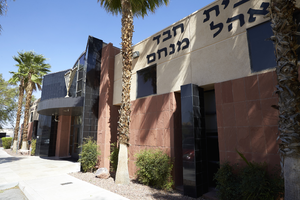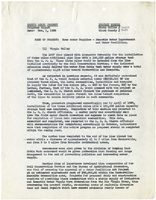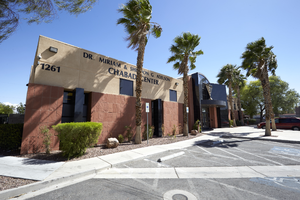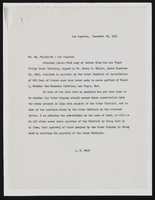Search the Special Collections and Archives Portal
Search Results

Photograph of Chabad of Las Vegas, Las Vegas (Nev.), September 22, 2016
Date
Archival Collection
Description
The Chabad of Las Vegas at 1261 Arville Street.
Image
Nevada Women's History Project Records
Identifier
Abstract
The Nevada Women's History Project Records (1995-2008) contain the early organizational records of the Nevada Women's History Project (NWHP), which was created to collect and disseminate information about women throughout Nevada's history. The collection reflects the early organization of the Nevada Women's History Project's (NWHP) Southern region and the variety of events and projects with which the organization was involved with across the state of Nevada. Materials include membership lists, meeting minutes, press releases, project files, and NWHP newsletters.
Archival Collection
Nevada Empowered Women's Project Records
Identifier
Abstract
The Nevada Empowered Women's Project (NEW Project) Records (1996-2001) consists of brochures, newsclippings, federal and state agency reports, and manuals about poverty and welfare rights pertaining to the activism of the NEW Project, headquartered in Reno, Nevada. The material chronicles the battles over welfare reform in the 1990s and also includes the full agenda and report for the 1999 Welfare Reform Conference held in Washington, D.C.
Archival Collection

County agent project progress report, Home water supplies - domestic water improvement and water facilities, November 1, 1938
Date
Archival Collection
Description
Discussion of the progress on domestic water for Bunkerville and Mesquite, Nevada. Prospects were good for the Work Projects Administration to install a tank and pipeline. PROJECT NUMBER: State Office # M-282, Clark County # M-22
Text
African Americans in Las Vegas: a Collaborative Oral History Project event roundtable
Identifier
Abstract
African Americans in Las Vegas: a Collaborative Oral History Project event roundtable conducted by Claytee D. White on January 18, 2014 for the African Americans in Las Vegas: a Collaborative Oral History Project. In this panel event, Jean Childs, Joe Neal, Jackie Brantley, LaVerne Ligon, and Ramon Savoy discuss their early lives and explain how they arrived to Las Vegas, Nevada. Childs talks about her father’s business, the Penguin Club, and the history of African Americans in the gaming industry. She talks about her involvement with the Economic Opportunity Board (EOB) and the Head Sstart federal program. Savoy remembers the foundation of
Archival Collection

Photograph of Chabad of Las Vegas, Las Vegas (Nev.), September 22, 2016
Date
Archival Collection
Description
The Chabad of Las Vegas at 1261 Arville Street.
Image

Photograph of Chabad of Las Vegas, Las Vegas (Nev.), September 22, 2016
Date
Archival Collection
Description
The Chabad of Las Vegas at 1261 Arville Street.
Image

Photograph of Chabad of Las Vegas, Las Vegas (Nev.), September 22, 2016
Date
Archival Collection
Description
The Chabad of Las Vegas at 1261 Arville Street.
Image
Meat and Provisions Project, 1936 to 1942
Level of Description
Archival Collection
Collection Name: John Wittwer Collection on Agriculture in Nevada
Box/Folder: Box 06
Archival Component

